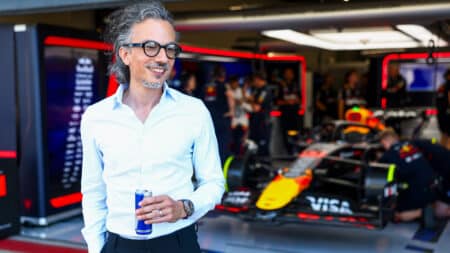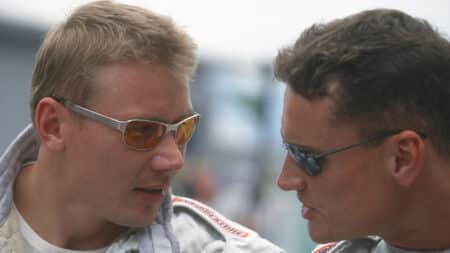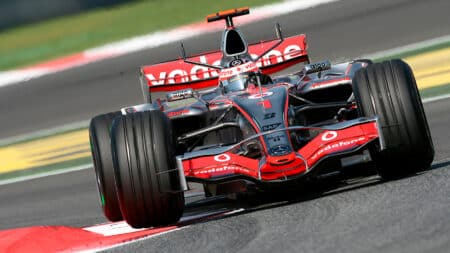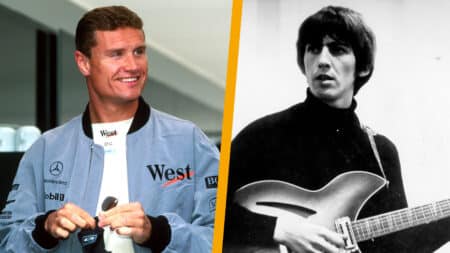
MPH: To the man trying to fill Christian Horner's shoes: good luck!
Laurent Mekies arrives as Red Bull F1 team principal with a series of immediate challenges to solve and long-term issues to tackle. He'll either sink or swim, says Mark Hughes
Michael Schumacher brought out the best – and the Devil – from our clean-cut, square-jawed hero.
It’s telling that six times in Formula 1 he finished second to David Coulthard. For the Scot always appeared much more determined to overtake his era’s benchmark than he did, say, Enrique Bernoldi’s Arrows at the 2001 Monaco Grand Prix. DC even flicked the finger at the Red Baron before completing a pass at the 2000 French GP.
Yet it is the rarer instance of Mika Häkkinen’s hackles-raised pass of Schumacher at Spa in 2000 that everybody remembers, not Coulthard’s almost identical, more measured manoeuvre in the wet at Interlagos in 2001; such is the fate of a team-mate shaded for speed.
No amount of openhanded co-operation by Coulthard, or detailed driver feedback – keenly sought and gratefully received at three F1 teams by the best designer of his generation – or outstanding podium consistency, or forthright passes of Schumacher could dislodge team-mate Häkkinen from his anointed role of McLaren’s ‘chosen one’. (In the Woking outfit’s defence, Mika was Michael’s pick as his number one rival.)
Ironically, it was Coulthard who opened the floodgates by steering aside at Jerez in 1997 and Melbourne in 1998 and thus unwittingly – yet at the same time wittingly – providing the consecutive victories that uncorked Mika’s bottled talent. His action on the latter occasion – reverting to a pre-race agreement when he would have been forgiven by most observers for considering it null and void after an unplanned and unnecessary pit visit for Häkkinen – was so Goody Two-Shoes that he would be forever deemed too nice. Ouch.
A couple of bollockings from Ron Dennis might have stood him in better stead: balls of steel rather than of iron pyrite. His ‘impediment’ of niceness couldn’t prevent him winning 13 times from 246 GP starts, but the seed of doubt about his lacking a potential world champion’s necessary ruthlessness had been sown. And Häkkinen quietly reaped the rewards, while DC finished second to him on 10 occasions.
Coulthard’s racing career, which officially ended on Sunday at Hockenheim’s DTM finale, contains much to admire even so: his back-to-back British GP wins at Silverstone are supported by braces at Monte Carlo and Melbourne, plus wins at Estoril, Monza, Imola, Spa and Interlagos. He also prevailed at Magny-Cours and the A1-Ring.
Despite a self-confessed (and relative) weakness in qualifying – particularly once the incessant and bewildering tinkering with its processes and demands began in 2003 – he registered 12 pole positions. His 18 fastest laps and 535 points indicate that he was happier when racing.
Truly he was a formidable accumulator.
Yes, it helped that only four of his 14-and-a-half seasons at the top level were undertaken in something other than an Adrian Newey car. Such opportunities, however, contain intrinsic pressures: his spin on the warm-up lap when on pole at Monza and that pit lane crash when leading at Adelaide, both in 1995.
He felt his goose was cooked at stone-faced Williams before these rare embarrassments – and his maiden win, in Portugal – and by mid-season had signed with a different team for 1996.
And McLaren were delighted to have him. You see, there was always a positive aura surrounding Coulthard – much of it his own making, some of it not – even though his progress through the junior formulae was hardly free from blemish.
He was sensational in junior Formula Ford in 1989, but his long cherished and consequently too tight lucky underpants – his poor mum was so embarrassed! – couldn’t prevent his breaking a leg at Spa in 1990 aboard a Formula Vauxhall.
He was by then on the first rung of Jackie Stewart’s ‘staircase of talent’. The next rung of Formula 3 in 1991 served to highlight those strengths and weaknesses. Undoubtedly that season’s best racer, with five wins (yet no poles) at home, plus successes at the prestigious Zandvoort Masters and Macau Grand Prix, he failed where his Paul Stewart Racing successors Gil de Ferran, Kelvin Burt, Jan Magnussen, Ralph Firman, Jonny Kane and Mario Haberfeld – not a GP win between them! – succeeded: West Surrey Racing’s Rubens Barrichello beat him to the British title.
His F3000 experience was notchy too: just one win in two seasons, with PSR and Pacific Racing.
He was facing a third season of it when news of Ayrton Senna’s death and a pending promotion from official Williams test-driving duties filtered through. He kept his emotions in check to finish runner-up at Silverstone the following day. This impressive trait always stood him in good stead – witness his second place at the 2000 Spanish GP mere days after picking a disbelieving path out of the wreckage of a horrific plane crash.
Of Stewart’s ‘graduates’, he was most like Jackie: all business, savvy and smart, in and out of the cockpit. As Jenson Button and Lewis Hamilton would, this unchallenged recipient of the inaugural McLaren/Autosport Award for young drivers (in 1989) seemed preordained for F1. Its ultimate prize eluded him – by some margin, it must be said – but he graced it and did his talent justice when measured against the best.
Martin Brundle has half-joked that his own 20 or so years behind the competitive wheel were, as it turned out, preparation for a job in the media. Now Coulthard, impressively at ease in front of the camera and increasingly illuminating and insightful down the mic, is following path similar to that of his manager/advisor’s, but only after completing a driving career blessed with a sturdier, more logical structure. This includes his four wise-owl seasons spent in the creation and founding of Red Bull Racing and two of expunging denouement in a DTM Mercedes-Benz.
As such, I would be extremely surprised if he were to hold any deep-seated regrets. He is a rounded individual who just happened to be quick.
Stirling Moss has stated that his dream GP team would have Tony Brooks as its number two driver. His ex-Vanwall team-mate was fast, neat and stylish, intelligent, self-motivating and uncomplaining, a facilitator and a contributor rather than a user and an abuser.
My dream team – the sensible, manageable one at least – would happily employ Coulthard in that same vital role.

Laurent Mekies arrives as Red Bull F1 team principal with a series of immediate challenges to solve and long-term issues to tackle. He'll either sink or swim, says Mark Hughes

Former McLaren F1 team-mates Mika Häkkinen and David Coulthard are set to renew old rivalries in a new Evening with... tour – they told James Elson all about it

In Formula 1, driver contracts may look iron-clad on paper, but history shows that some of its biggest stars have made dramatic early exits

Former McLaren F1 ace told James Elson about his private audience with The Beatles' George Harrison, who played an unreleased grand prix-themed song